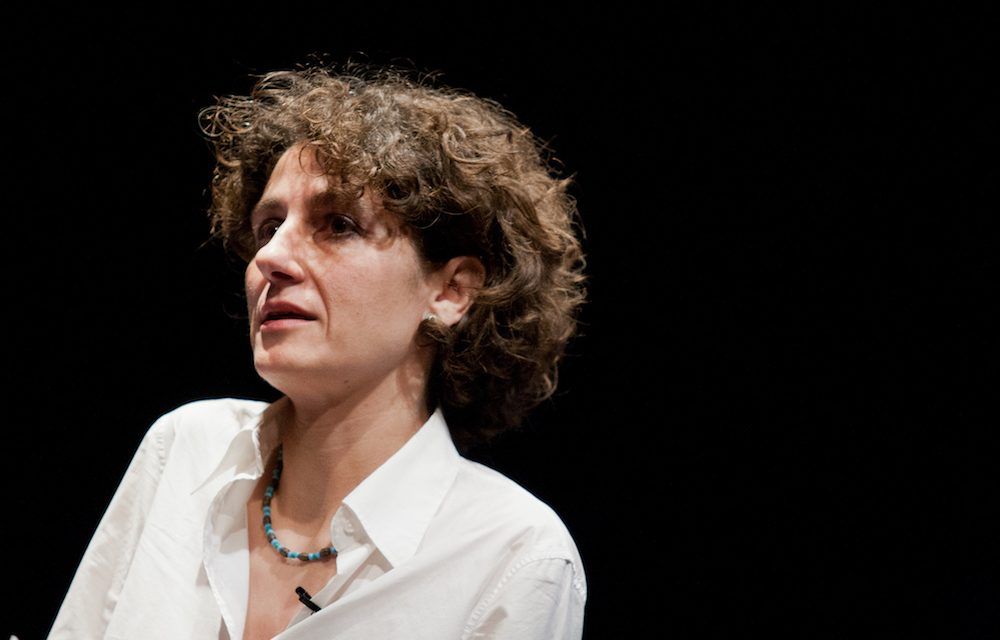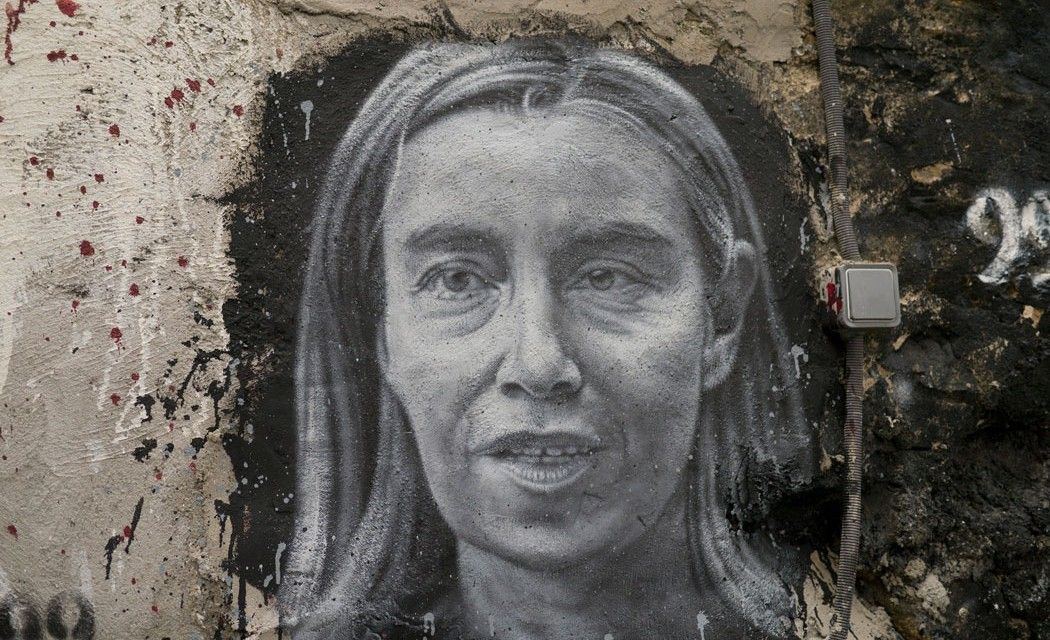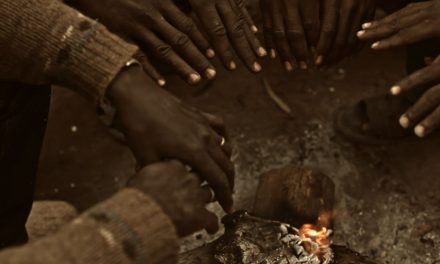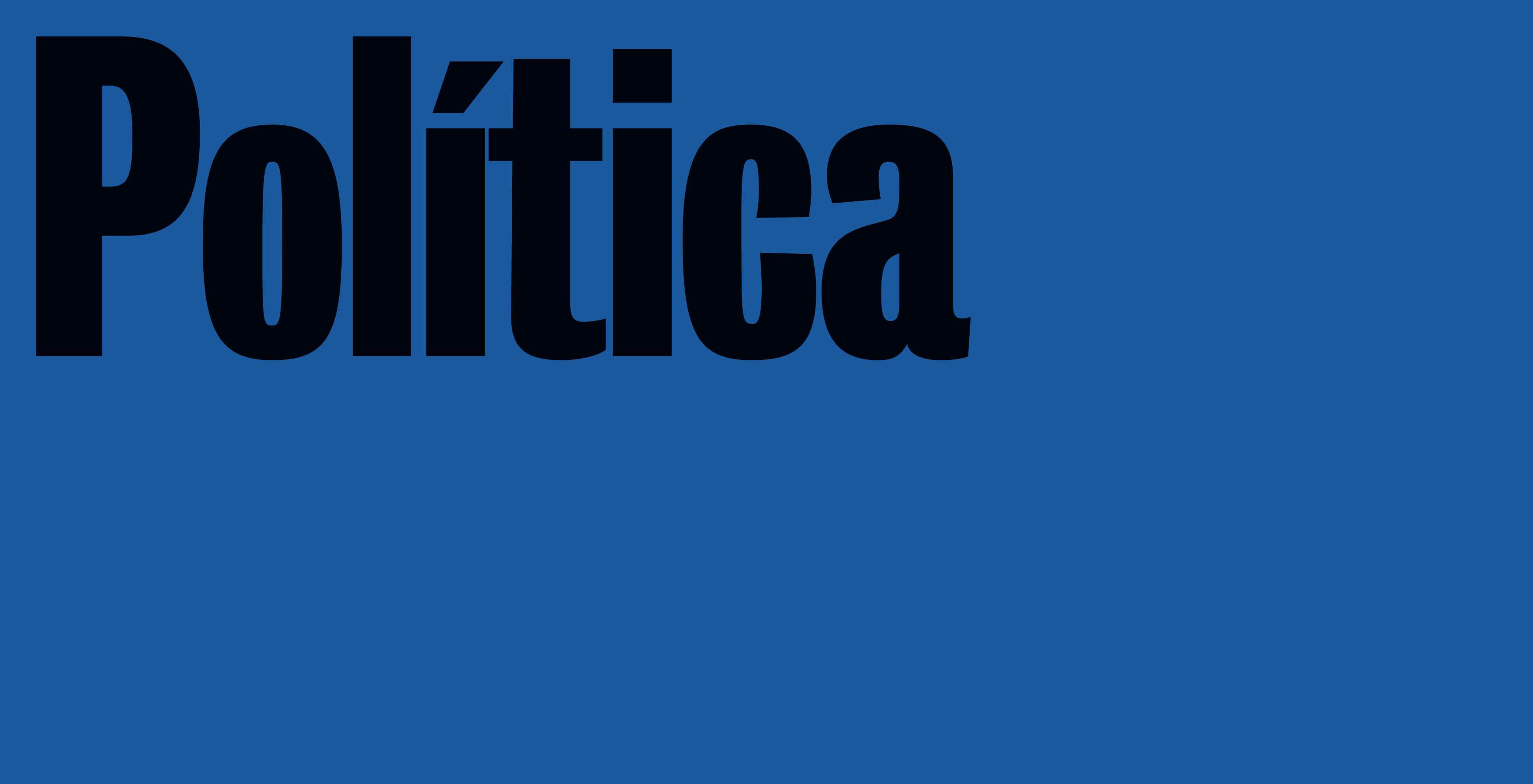We are living through an accelerated worsening of the material conditions of life. The intrinsic crisis of capitalism, based on growth and speculation, is becoming increasingly evident, both in its social impact and in the scientifically demonstrable limits of the planet and its resources. In this context, fascination with the apocalypse is the dominant narrative of our time and has strongly influenced the political, aesthetic and scientific spheres.
In her essay New Radical Enlightenment (Anagrama, 2017) the philosopher Marina Garcés warns that this fascination perpetuates a sense of impotence, linked to the impossibility of dealing with and intervening in one’s own living conditions. Is it not precisely our attitude of surrender, she suggests, that could actually be taking our species to the edge of its sustainability?
For Garcés, postmodernity has given way to a ‘posthumous condition’, which manifests itself in the blind belief in this story about the irreversible destruction of our living conditions. At the same time, she posits an “enlightened illiteracy” behind this: we know everything but we cannot do anything. This attitude has different effects, from the way in which power systems or identities are configured, up to the very meaning of actions. Faced with this, Garcés suggests reclaiming the vital link between knowledge and emancipation. To do so she suggests a radical new enlightenment with ‘the critic’ as its principle weapon.
By ‘new enlightenment’ the philosopher does not mean recovering the modernizing project that, since the eighteenth century and with the expansion of capitalism through colonialism, dominated the world, but enlightenment as an attitude; a critical attitude that implies asking ourselves why we believe what we believe. ‘Credulity’ is the basis of all domination, as it implies a delegation of intelligence and conviction. Without criticism, knowledge tends to become useless because although we access its contents we do not know how or from where to relate these strands. The new enlightenment is not about knowing what is most correct, but what is the most accurate relationship with each of the various forms of experience and knowledge.
Last October, La Grieta met with Marina Garcés at the Transeuropa Festival, organized by European Alternatives, to chat with her about apocalyptic discourse, and alternatives to it.
As early as the 50s Günther Anders wrote in The Obsolescence of Man that our species has become small with respect to its own actions. Human activity, both individually and collectively, can no longer be equivalent to the level of the complexity it generates. How does this relate to the idea of the loss of the future and current apocalyptic discourses?
Today many speak about the non-future as if it was a kind of catastrophic objectivity. We already know that, in a way, everything tends to its own destruction by the very facts of our consumption, production, the way we expend energy or even how we psychically mistreat ourselves. But I think that what really disconnects us from the future or makes us have a relationship of loss of control over this is precisely what you pick up on in the question: this impossibility of imagining, of having a direct relationship with the consequences of our own actions, both about what I do and what we do. This is true of decisions about a neighbourhood, a city, a country or even Europe.
Every one of these types of ‘us’ is unable to perceive that an action and its consequences have a more or less direct and manageable relationship. This is how we lose the future, as a dimension of time in which the consequences of our actions are contingent on our ability to relate to them. The problem – which becomes apocalyptic – is that we tend to translate this in terms of irreversibility: it can only go wrong, because we are not able to intervene in the course of things. This is what I challenge in my writing. Since the scope and scale of the consequences of personal and collective action are disproportionate to what we are capable of thinking, deciding and doing does not mean that things can only get worse. Maybe we have to develop other ways of thinking and thinking about ‘us’ in relation to the future.
Philosophy is a discourse that picks up voices. But as soon as a preservationist relationship appears alongside it, it dies
It seems that philosophy has also lost this capacity for transformation, to generate action.
Philosophy collects and expresses this crisis of civilization, which is not only an objective crisis but also subjective, because it calls into question the ways in which we have thought, as subjects of action. In this current experience, philosophy finds itself without categorical frameworks to relate to these new conditions. Often it is simply reduced to a product of the past – which thankfully continues to be studied – yet philosophy can only be defended by making philosophy, not just preserving it. It is a discourse that picks up voices. But as soon as a preservationist relationship appears alongside it, it dies. It’s like enclosing a plant in a laboratory: you can end up knowing it very well, but it is not alive. It is doing something else.
After a very critical end to the 20th century, especially in the 70s and 80s, there has been a certain retreat of this kind in philosophy in recent decades. Not knowing how to think through our times has reduced philosophy to a kind of legacy, a cultural heritage of the past with which we do not know what to do. With this in mind my proposal is to look constantly for ways to continue doing philosophy. That means exposing oneself to ‘thinking what we don’t know how to think’ by creating the right situations.
Along with this sense of incapacity is the fascination with ‘everything before’. There is a tendency at the moment to glorify the pre-modern or any form of precolonial life simply by its virtue of being so. On an ecological level this can also be related to that bucolic idea, still very widespread, of a nature not yet corrupted by humans.
Exactly. On the one hand, we do not know how to look at that future that is falling apart. On the other, we cannot relate to the conceptual tools of philosophy – but also those of many human, social sciences, etc. – because even though we have access to many analyses of many things, these do not give us powerful frames of understanding. Our gaze is therefore projected towards a past, towards the authentic or the previous, to all that which has led us to the present situation.
In his last book, Zygmunt Bauman refers to these as “retrotopies,” which occur when the past becomes the place where utopia is projected. Obviously they are fictitious passages. For example, it tends to praise Europe, as if it had a past of democratic egalitarian splendor. In fact the history of Europe involves endless wars with many battles as well as many wonderful creations and inventions. The utopian past, though, I do not know where to find it. As with everything nature is a key case, so sometimes I take up some things like the cities in transition, and the ecology of the poor that Joan Martínez Alier talks about in Barcelona.
I see an important shift with respect to more ‘modern’ environmentalism, a kind that still had an idea of a different nature, separate from society and the human and, therefore, that one could care for, preserve or defend as something ‘other’. Many of the current forms of environmentalism no longer handle this previous concept of nature; the approach is no longer preservationist but more ecosystemic, it is more about thinking about how to combine, how to live in a dynamic and, therefore, transformative way.
‘Untransformed nature’ no longer exists but, on the other hand, there are different ways of coexisting in this activity of transforming the environment as something that is not outside of us, but that we are simultaneous with. This is where the necessity of rethinking the human opens up: the humanistic tradition, the continuity between the human, the natural and the technological, capitalism… there is a struggle about how to situate ourselves in this continuity, and this feeds into very different interests depending on how the question is posed.
The algorithm also draws ideology, emotionality, world views, assessments about what lives count and what lives don’t
In fact, we now see growing trends such as posthumanism and transhumanism, and also the complaints of their detractors. In this context, you’ve highlighted the danger of delegating to the machine.
These are things that I’m working on right now, so I’m not an expert. But for me the problem is not in the debate between the artificial and the human, which is where precisely these humanist-type positions remain: in the fear of the machine and the robot, in a kind of neoluditism; as if there were something authentic and pure to save in the human that had nothing to do with the technical. We cannot address the current transformations if we remain solely in the ‘do not touch the human’ position, in a kind of quasi-religious gesture.
From the other ideological extreme, there are two other positions that amount to the same thing as the technophobic vision. On the one hand, the idea that only artificial intelligence can bring us up to what today’s latest capitalism needs in terms of productivity, intelligence and intensive processes. Then there is the same operation in reverse, which implies the appearance of new techno-utopias of an emancipatory kind. It is the idea that only hackers, AI or cyborgs can save us from slavery, work, the precariousness of life, environmental destruction, etc.
I believe that nothing can save us, in the sense that if we think of ourselves in terms of salvation and condemnation there is no salvation. But I do not believe that we are condemned either. That is to say, I believe that critical thinking, capable of discerning and analyzing what is happening in each context and in each moment, does not have to accept this code of condemnation-salvation that both capitalism and its critics are increasingly using.
In this continuity between the human, the natural and the technological it is necessary to analyze which relations give us more capacities for emancipation and those that subordinate or subject us more to conditions of exploitation and delegation. Because mainly what happens in this disproportion between what we can do and what we imagine we can do is that the ability to think, imagine and work with what we do is so far away, that we end up delegating more executive functions than we should. Of course we also delegated the ox to drag the plough, which is to say we have always transferred part of our activity. Human societies are sets of delegations.
The problem is that in this thinking we find a kind of anthropological surrender. What worries me is the thought that as humans we cannot and do not know how to relate to what we do, that someone else has to come and do it for us. Almost anything can fit into this structure: from a super leader, the mega-entrepreneur Donald Trump, to the war robot or doctor robot. Regarding the latter it doesn’t seem a bad idea to me that they exist, but it’s another thing entirely what relationship we are willing to have with what we invent.
Artists and researchers such as James Bridle or Zach Blas warn of, for example, the false neutrality attributed to algorithms. We believe in the ‘objectivity’ of these but they already control many areas of our daily lives. We are delegating very serious decisions to them.
We delegate neutrality to them. In some studies that I have read about war robots, they no longer refer to the robot that is going to deactivate the bomb or the drone that is going to launch the missile, but robots designed to decide when, how, to whom and in what way they are bombing. The final decision is transferred to them under the assumption, from the ethics of war, that it will be more neutral and fairer because the algorithm does not have the biases of ideology and emotion. But the algorithm also draws ideology, emotionality, world views, assessments about what lives count and what lives don’t. Under this kind of delegation we allow ourselves to believe that their decision will always be better.
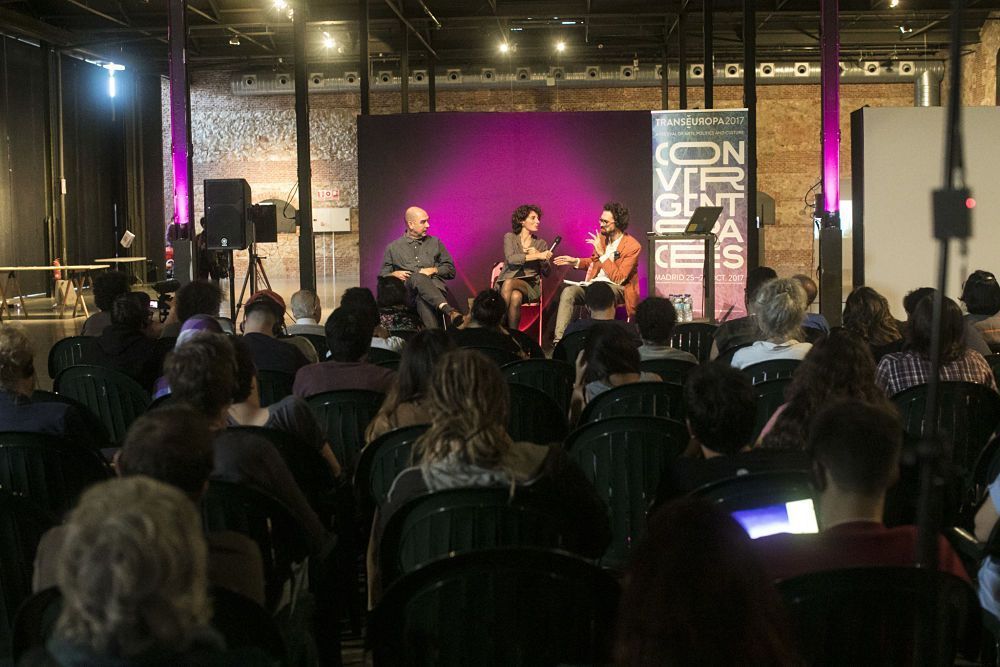
TRANSEUROPA Festival 2017. Picture by Elisa Sánchez Fernández,
You say that every time and society has its forms of ignorance. Given the excess of information to which we are exposed, if previously credulity was based on the absence of knowledge, now it is more due to an overdose that prevents us from assimilating and elaborating. It is in the context of this paradigm shift that it becomes more evident that access to knowledge does not imply action.
This is one of my biggest concerns. For some centuries, the popular struggles for literacy, for the public school or for the democratization of access to knowledge were based on the idea that if we get access to what is denied to us by the corresponding monopolies – the aristocracy first, then the bourgeoisie – we would be free: “knowledge is power”. There was the belief that having access to education or literacy could make people capable of knowing, of being informed and, therefore, of acting accordingly on knowledge.
What have we proven in these last decades in Spain and elsewhere? That emancipatory effects are not derived from access to knowledge. So the question is, how has this happened? What is this critical neutralization of access to knowledge made of?
One of the answers is saturation, clearly. There are others, however, of a more political nature, of a qualitative type. Unless we implant lots of chips into ourselves, there is no human way to relate to knowledge that is not ultimately passive, given the volume and intensity of the information we receive permanently and that, in addition, is often redundant and false. The problem is not even this, but the fact that it no longer generates any kind of relation to some kind of reciprocity. Imagine those ducks that they feed excessively to make foie gras. Sometimes I have the feeling that we are like those ducks: they tell us everything until our liver swells and it bursts.
Earlier you mentioned the ‘cities in transition’ as a new narrative that encourages action. What are these cities in transition?
Cities in transition is a movement that began in England and that starts from the idea that it is not so much about adopting one model or another – production, consumption, exploitation – nor thinking only about the future and of models, but of building transformation practices, not only in the present (as if this was a static idea), but in transit. In other words, if we decide to wait to not have gasoline cars to start changing the energy models, that moment will never come.
I like this idea of how criticism and transformation can coexist in time. We already know that criticism today leads us to challenge almost entirely the ways we have to live, but the fact that criticism is necessarily total does not imply that the practice has to wait to be able to relate to that whole, because then we are already once again in the moment of disproportion: you cannot relate to the whole, because you are very small in relation to it.
The cities in transition are full of examples of the first thing that you asked me, of how to begin to make you find what, by ratio of proportion, could not previously be found. The small change and the total change, the daily practice and the transformation of the world, the speed at which certain changes are imposed and the slowness of the consequences of those changes. All these are transitions that we can think of from very concrete experiences.
I also transfer this idea to the field of humanities, since the debate around these has remained stuck in an approach similar to modern environmentalism. “How to save the humanities,” “how to save culture” or “how culture can save us”. These are very preservationist, salvationist and conservative concepts and, in the end, also very purist.
How do you think the current political system relates to culture? What possibilities do you think it gives to culture?
I believe that the current system, against what it might often seem, does give a lot of importance to culture, but only in a way that is of interest to the system itself. It is not that it relegates culture to the sideline, but that, at least in western societies with more or less social welfare, it makes it the main battlefield: that is where is the consumerist society is built, along with uncritical subjectivity. This means that today’s culture builds citizens through an attitude of consumption.
The individual consumes according to a list of possibilities among which he or she can choose, as if it was a menu: political options, lifestyles, ways of being in the world. Culture is not just going to the movies or buying a book, culture is the way in which we understand and shape the way we live together. It is through the culture industry – which ranges from clothing design to commercial cinema, from television to social networks – that we live today as uncritical consumer citizens.
In this context, counterculture is the only one that goes some way towards breaking its own social function. Philosophers such as Nietzsche and Deleuze argued that one can only think against one’s own time. This ‘against’ is not necessarily a destructive force, but the other way around, a creative one: only by creating other ways of understanding and valuing our ways of life we can start thinking and sharing, which is what culture is supposed to be. Yet the cultural forms that the system produces are those that subordinate us more and more, even if they present to us the idea that the market and culture are in opposition. In reality, however, culture is the market, and the market is culture.
Translated by Marta Cillero. The English version was first published in Political Critique.

